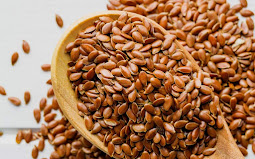amazing Health Benefits of Flaxseed
Do you know?
Amazing Health Benefits of Flaxseed
Flaxseed offers protein, fiber, and omega-3 fatty acids in a single serving. It may assist in maintaining a healthy weight, lowering blood pressure and cholesterol, and lowering the risk of some malignancies.
Cardiovascular Disease Prevention
The most common cause of death in the US is heart disease. Flaxseeds can lower the risk of heart disease in a number of ways, primarily by influencing the following risk factors:Lowering blood pressure:
Flaxseeds were found to lower blood pressure, especially when taken for 12 weeks or more, according to a review of 15 trials published in Clinical Nutrition.
Raising cholesterol: A study of fifty high-cholesterol adults revealed that those who had roughly three tablespoons of roasted flaxseed powder every day for three months had far lower levels of LDL ("bad") and total cholesterol than the placebo group. Additionally, they noticed a rise in HDL ("good") cholesterol.
Improved Digestive Health
Fiber is an essential component for healthy digestion, and four tablespoons of flaxseeds supply you 27 percent of your daily required consumption.
Among the advantages of fiber are:
- Accelerating your sense of fullness
- Aiding with weight management
- How to avoid constipation
- Furthermore, soluble and insoluble fiber included in flaxseeds each slightly alter how bowel motions are improved:
When ingested with enough fluids, soluble fiber softens stool to facilitate easier passage through the digestive tract. Insoluble fiber gives stool more volume, which accelerates the passage of waste through your digestive tract and relieves constipation.Control of Weight
Because flaxseeds contain soluble fiber, including them in your diet may aid in healthy, long-term weight management. Mucin, or 35%–45% of the soluble fiber in flaxseeds, is the majority of the fiber. Mucin takes the shape of a gel when mixed with water. This helps you feel fuller for longer by slowing down the rate at which food moves through your stomach.
After evaluating 45 research, a meta-analysis concluded that consuming whole flaxseeds was linked to a significant decrease in waist circumference and body weight.
A waist circumference greater than 35 inches for women and 40 inches for males is linked to an increased risk of type 2 diabetes and heart disease.
Better Blood Sugar Levels
Elevated blood glucose levels may signify the existence of certain diseases, such as type 2 diabetes. Flaxseeds may help mitigate the risk of high blood sugar that comes with being overweight.
For 12 weeks, a group of 41 obese and pre-diabetic participants were randomly assigned to receive 13 grams, 26 grams, or 0 grams of flaxseed each day. It was discovered that people who took in 13 grams (about two tablespoons) of flaxseeds daily experienced the biggest drops in blood sugar and the biggest improvements in insulin sensitivity.
Defense Against Prolonged Illness
Apart from its health-promoting fats and fiber, flaxseeds are abundant in antioxidants known as Polyphemus.
Our cells are defended by Polyphemus, who function as protectors against oxidative stress, cancer, and other chronic illnesses including heart disease.
Cardiovascular Disease Prevention
The most common cause of death in the US is heart disease. Flaxseeds can lower the risk of heart disease in a number of ways, primarily by influencing the following risk factors:Raising cholesterol: A study of fifty high-cholesterol adults revealed that those who had roughly three tablespoons of roasted flaxseed powder every day for three months had far lower levels of LDL ("bad") and total cholesterol than the placebo group. Additionally, they noticed a rise in HDL ("good") cholesterol.
- Accelerating your sense of fullness
- Aiding with weight management
- How to avoid constipation
- Furthermore, soluble and insoluble fiber included in flaxseeds each slightly alter how bowel motions are improved:
After evaluating 45 research, a meta-analysis concluded that consuming whole flaxseeds was linked to a significant decrease in waist circumference and body weight.
A waist circumference greater than 35 inches for women and 40 inches for males is linked to an increased risk of type 2 diabetes and heart disease.
Better Blood Sugar Levels
Nutrition of Flaxseeds
Flaxseeds may be tiny, but they're chock full of nutrients. A quarter cup—about four tablespoons—of whole flaxseeds supplies:5
- Calories: 224
- Fat: 17.5g
- Saturated Fat: 1.5g
- Unsaturated Fat: 16g
- Sodium: 12.6mg
- Carbohydrates: 12g
- Fiber: 11.5g, or 41% of the daily value (DV)
- Added Sugars: 0g
- Protein: 7.7g
- Thiamin: 0.69mg 57% DV
- Magnesium: 165mg 39% DV
- Selenium: 7.12mcg 19% DV
- Iron: 2.4mg 13% DV
Advice for Eating Flaxseeds
When purchasing flaxseeds, choose ground flaxseeds rather than whole ones because the latter can pass through your digestive tract undigested. This stops nutrients from entering the bloodstream and being absorbed..
If you can't find whole flaxseeds, don't worry; you can grind them yourself right before eating in a coffee grinder.
Just be careful where you keep your flaxseeds; light and air cause the oil to degrade, so store them somewhere cold and dark, like the freezer.
Easy recipes for flaxseeds include:
- Sprinkled on oatmeal or overnight oats
- Mixed into yogurt
- Added to pancake batter
- Used as a garnish for snacks like smoothies, fresh fruit, and avocado toast
- Folded into nut butter along with oats to make energy balls
- Baked into cookies, muffins, brownies, and banana bread
Flaxseeds can also be substituted for eggs in vegan baking recipes. For each egg called for in the recipe, simply combine one tablespoon of ground flaxseed with three tablespoons of water.
Reminder: It's crucial to increase fiber gradually and to drink lots of water when incorporating it into your diet. Increased dietary fiber intake too soon might cause unpleasant digestive issues such as cramps, gas, bloating, and diarrhea.
When purchasing flaxseeds, choose ground flaxseeds rather than whole ones because the latter can pass through your digestive tract undigested. This stops nutrients from entering the bloodstream and being absorbed..
If you can't find whole flaxseeds, don't worry; you can grind them yourself right before eating in a coffee grinder.
Just be careful where you keep your flaxseeds; light and air cause the oil to degrade, so store them somewhere cold and dark, like the freezer.
Easy recipes for flaxseeds include:
- Sprinkled on oatmeal or overnight oats
- Mixed into yogurt
- Added to pancake batter
- Used as a garnish for snacks like smoothies, fresh fruit, and avocado toast
- Folded into nut butter along with oats to make energy balls
- Baked into cookies, muffins, brownies, and banana bread
Reminder: It's crucial to increase fiber gradually and to drink lots of water when incorporating it into your diet. Increased dietary fiber intake too soon might cause unpleasant digestive issues such as cramps, gas, bloating, and diarrhea.






Comments
Post a Comment